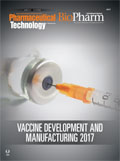ADVERTISEMENT
 |
|
|
Top BioPharm International News Stories of 2017
Following a vote by member states in favor of Amsterdam as the agency’s new headquarters, the relocation will take place over the next 16 months, with operations expected to start up in March 2019.
/ read more /
A mutual recognition agreement to accept inspection data from eight EU regulatory authorities may reduce inspection burdens at global drug facilities.
/ read more /
The acquisition adds to Catalent’s capabilities in biologics development, analytical services, manufacturing, and finished product supply.
/ read more /
FDA approves Novartis’ CAR-T therapy, marking the first time a cell therapy based on gene transfer has been approved in the United States for any indication.
/ read more /
|
|
|
SubscribeSubscribers can enjoy each full issue of BioPharm International in print, or via BioPharm apps.
subscription offers
|

|
|
|
The Senate voted 94–1 to approve legislation reauthorizing user fees and a series of program changes.
/ read more /
Thermo Fisher will acquire Patheon for approximately $7.2 billion, including the assumption of approximately $2 billion of net debt.
/ read more /
UC Berkeley appealed the February 2017 decision that determined Harvard and MIT’s Broad Institute and Berkeley’s CRISPR-Cas9 technologies were separately patentable.
/ read more /
|
|
|
|
The White House said President Trump will nominate Scott Gottlieb to the position of FDA commissioner.
/ read more /
The Patent Trial and Appeal Board ruled in favor of the Broad Institute, allowing the institution to keep patents for its CRISPR-Cas9 gene-editing
technology.
/ read more /
A total of 166 biotech executives penned an open letter expressing concern over President Donald Trump’s executive order on immigration.
/ read more /
|
|
|
Top BioPharm International Feature Stories of 2017
There is much work to do to achieve efficient, cost-effective production processes.
/ read more /
Excipient selection strongly influences lyophilization performance for biologic drugs.
/ read more /
Despite limitations, mass spec is having an impact on biologic drug development and manufacturing.
/ read more /
The objective of this study was to assess the impact of manufacturing-scale, freeze-thaw conditions on aggregation and subvisible particle formation of a monoclonal antibody solution (mAb-A; IgG1) using a small-scale model.
/ read more /
The decision to use disposable bioreactors is now driven by commercial rather than technological considerations.
/ read more /
|
|
|
For cellular materials, new ultra scale-down devices inform large-scale downstream processing techniques.
/ read more /
This article summarizes the approaches, challenges, and future perspectives for the characterization of N-glycans in biopharmaceutical products.
/ read more /
The author outlines an analytical strategy for establishing similarity in biosimilar development and approval.
/ read more /
The authors review how media components modulate the quality of monoclonal antibody products.
/ read more /
This study outlines methods for an alternative protein-polishing process for challenging proteins.
/ read more /
|
|
|
Events
February 7–8, 2018
February 11–14, 2018
March 12–14, 2018
more events
|
|
|
eBook

|
Vaccines—from childhood and influenza immunizations, to epidemic prevention, to cancer and therapeutic treatments—present unique development challenges. In this Vaccine and Manufacturing eBook, the editors explore development and manufacturing options to make vaccines more accessible.
|
|
|
|
|
|